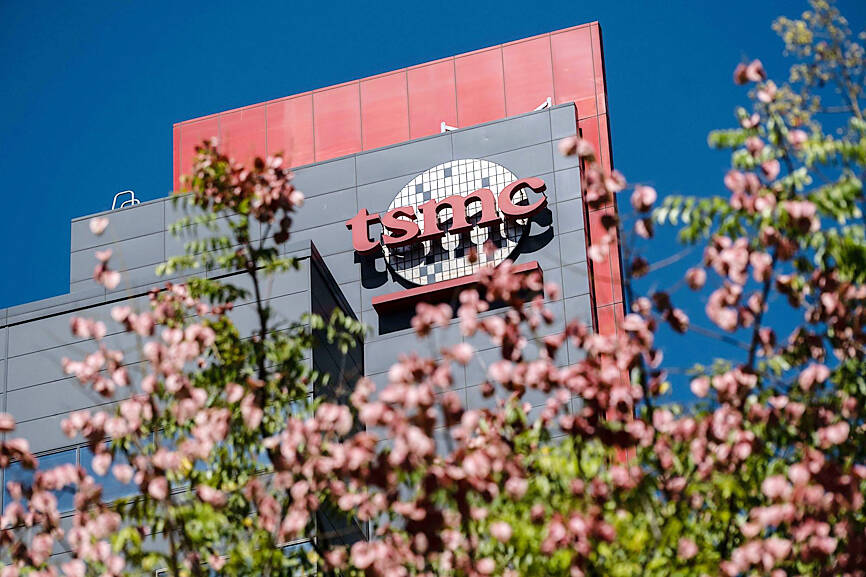Taiwan Semiconductor Manufacturing Co (TSMC, 台積電) has announced that plans to bring its advanced 2-nanometer (nm) technology into mass production by 2025 are still on track.
TSMC is battling to maintain its lead over main rivals Intel Corp and Samsung Electronics Co, which aim to start production of 2nm chips next year and in 2025 respectively.
TSMC announced the timeline for 2nm production at its North America Technology Symposium in Santa Clara, California, on Wednesday.

Photo: Bloomberg
More than 1,600 customers and partners registered to attend the event, the first of an international series of technology symposiums hosted by the world’s largest contract chipmaker, TSMC said.
During the event, TSMC showcased its latest technology developments, including progress in 2nm technology and new members of its industry-leading 3nm technology family, as well as 3DFabric, a comprehensive family of 3D silicon stacking and advanced packaging technologies.
The company said that the development of its 2nm technology, which utilizes nanosheet transistors, was making progress in yield and device performance, and it is set to enter production in 2025 as scheduled.
The company’s 2nm technology would be up to 15 percent faster than its 3nm enhanced (N3E) process technology at the same power, with up to 30 percent lower power use at the same speed, and chip density of more than 15 percent greater than N3E.
Regarding its N3E products, TSMC said its 3nm technology was in volume production, with an enhanced N3E version set to enter high-volume manufacturing in the second half of this year.
Following N3E, TSMC would continue to optimize the N3 family’s transistor density with 3nm performance enhanced technology, which would build on N3E by offering better power, performance and density, the company said, adding that production would be ready in the second half of next year.
Its N3X product, which is tailored for high-performance computing applications and can support higher voltage and frequency — and therefore has stronger computing power — is to enter mass production in 2025, it said.
In addition, its Auto Early product would be available this year, offering automotive process design kits based on N3E, and allowing customers to launch designs on the 3nm node for automotive applications, leading to the fully automotive-qualified N3A process in 2025, TSMC said.

Three experts in the high technology industry have said that US President Donald Trump’s pledge to impose higher tariffs on Taiwanese semiconductors is part of an effort to force Taiwan Semiconductor Manufacturing Co (TSMC, 台積電) to the negotiating table. In a speech to Republicans on Jan. 27, Trump said he intends to impose tariffs on Taiwan to bring chip production to the US. “The incentive is going to be they’re not going to want to pay a 25, 50 or even a 100 percent tax,” he said. Darson Chiu (邱達生), an economics professor at Taichung-based Tunghai University and director-general of

Hon Hai Precision Industry Co (鴻海精密) is reportedly making another pass at Nissan Motor Co, as the Japanese automaker's tie-up with Honda Motor Co falls apart. Nissan shares rose as much as 6 percent after Taiwan’s Central News Agency reported that Hon Hai chairman Young Liu (劉揚偉) instructed former Nissan executive Jun Seki to connect with French carmaker Renault SA, which holds about 36 percent of Nissan’s stock. Hon Hai, the Taiwanese iPhone-maker also known as Foxconn Technology Group (富士康科技集團), was exploring an investment or buyout of Nissan last year, but backed off in December after the Japanese carmaker penned a deal

WASHINGTON POLICY: Tariffs of 10 percent or more and other new costs are tipped to hit shipments of small parcels, cutting export growth by 1.3 percentage points The decision by US President Donald Trump to ban Chinese companies from using a US tariff loophole would hit tens of billions of dollars of trade and reduce China’s economic growth this year, according to new estimates by economists at Nomura Holdings Inc. According to Nomura’s estimates, last year companies such as Shein (希音) and PDD Holdings Inc’s (拼多多控股) Temu shipped US$46 billion of small parcels to the US to take advantage of the rule that allows items with a declared value under US$800 to enter the US tariff-free. Tariffs of 10 percent or more and other new costs would slash such

SENSOR BUSINESS: The Taiwanese company said that a public tender offer would begin on May 7 through its wholly owned subsidiary Yageo Electronics Japan Yageo Corp (國巨), one of the world’s top three suppliers of passive components, yesterday said it is to launch a tender offer to fully acquire Japan’s Shibaura Electronics Co for up to ¥65.57 billion (US$429.37 million), with an aim to expand its sensor business. The tender offer would be a crucial step for the company to expand its sensor business, Yageo said. Shibaura Electronics is the world’s largest supplier of thermistors, with a market share of 13 percent, research conducted in 2022 by the Japanese firm showed. If a deal goes ahead, it would be the second acquisition of a sensor business since